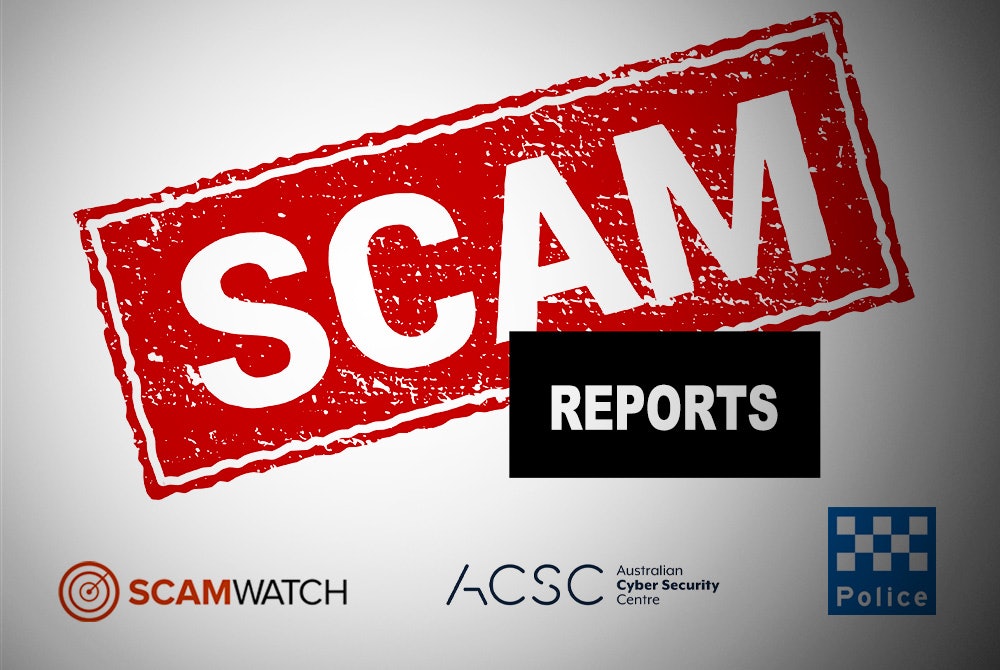- Quick Guide to Reporting Scams
- Quick Guide to Scam Support Services
- In Depth Guide to Reporting Scams
If you've fallen victim to a scam or fraud, you're not alone. Scammers are getting smarter and coming up with new ways to trick you into sending money or giving up your personal information, so it's no wonder millions of people fall victim to scams every year. To help fight the growth in scamming it is important that you keep as much evidence report it, even if you think that it won't make a difference or you feel embarrassed for getting tricked. The most effective way to report and recover from being scammed to work collaboratively with your financial institution to protect your money, the police to report the crime and IDCARE to help you formulate a recovery plan. To make it easier, we have narrowed it down to the most important ones.
Quick Guide to Reporting Scams
Are You In Immediate Danger?
If you or someone that you know has been threatened or is at risk call triple zero (000).
If you think that you have been scammed it is important to report it, so it can be investigated and to minimise your financial loss or damage.
| Organisation | Service | Contact |
|
Your Financial Institution |
If you think you have had your identity stolen you should contact your financial institution immediately, so they can put a freeze on your account and monitor for any suspicious activity. | Visit their website for contact details. Most of them will have a dedicated fraud reporting line. |
| The Local Police | Most fraud is investigated at a local level. You should report any instance of fraud or attempted fraud including identity theft to the police. |
Police Assistance Line
|
| ReportCyber (ACSC) | This is a national policing initiative. Reports through this service are referred to the appropriate police jurisdiction. | |
| ASIC | If you have been the victim of a finance or investment related scam e.g. overseas shares or cryptocurrency investments | |
| The Implicated Business or Agency | If a scammers has used a platform or the name of a brand to commit fraud you should report it to that business e.g. Facebook or ATO | Many larger businesses will provide details on how to report fraud. If not, call them or send a message via their contact form. |
Quick Guide to Scam Support Services
Being scammed can be stressful and there are support services available to help you get through it and recover.
| Organisation | Service | Contact |
| IDCARE | This is a free service provided by the government to help victims of identity theft. They provide access to case managers who will help you formulate a recovery plan. |
|
| Beyond Blue | If you are feeling depressed or anxious |
|
| Lifeline | Crisis support |
|
| Scamwatch | They collect distribute information to the public and government organisations in Australia. They do not help you recover lost money or assist if you have had your identity stolen. | |
| ACMA Do Not Call Register | You can register you phone number to opt out of receiving telemarketing calls. | |
| eSafety Commissioner | Provides a reporting and support service for those who experience cyberbullying or cyber abuse. They work with victims to try to get harmful material removed. |
In Depth Guide to Reporting Scams
If you've been scammed out of your money, it is usually unlikely that you'll get it back since scammers will request payment via wire transfer, gift cards, or other untraceable and non-refundable methods.
However, there are a few things you can do to try to recoup at least some of your losses.
Contact Your Bank/Financial Institution
If you transferred payment from your bank or credit card account, call your bank immediately and see if they're able to reverse the charges or cancel the transfer. Although your bank's fraud protection may not cover transactions that you willingly made (even though you weren't aware it was a scam), there is a slight chance they can help you get your money back.
Some credit cards offer more protection than others when it comes to fraud. In most cases, it's safer to complete transactions using your credit card rather than your bank account.
Contact the Payment App
If you transferred money through third-party apps or sites like PayPal, contact customer support for the app and report the fraud. If you willingly transferred money to a scammer (before you realised you were being scammed), these apps may not be able to do anything, but it's worth a try.
PayPal, for example, offers fraud protection for both buyers and sellers, as long as the transaction meets the requirements for a refund.
Report Scams to ReportCyber (ACSC) or Local Authorities
The Australian Cyber Security Centre's, ReportCyber helps to protect the community from internet crime by providing a mechanism to report, fraudulent activity, and bad business practices in the Australia. When you report fraud, the ReportCyber will share this information with local police and other government agencies in an attempt to help stop the scammers.
If you feel more comfortable dealing with your local police you can report the incident at the local station.
Internet crime refers to any illegal activity, including scams, that was committed using the Internet, on the Internet, or through the Internet, including via chatrooms, online forums, email, and websites. Examples of internet crime include, but aren't limited to:
- Counterfeit products being sold online
- Romance or dating scams occurring via online apps or websites
- Phishing emails
- Money transfer scams using online apps/websites
- Fake rental listings on sites like Craigslist
- Non-shipment of items bought online
- Computer hacking
- Malware and viruses
- Advance-fee scams
You can file a scam report to the ACSC online. You'll need to provide as much information as possible, including (if you have it):
- Details of what happened, including dates and any financial transactions made
- The victim’s gender, date of birth and contact details
- Whether the victim is willing to make a formal statement
- Type of cyber abuse:
- Online abuse and threat
- Identity fraud and identity theft
- Money loss or compromised accounts
- Devices impacted with ransomware or malware
The more information you provide, the more helpful it will be to the police. If possible, you should keep screenshots and evidence of the scam in case authorities need them for their investigations. Evidence can include things like:
- Money transfer receipts or transactions
- Emails and text messages
- Envelopes (if you received a package)
- Phone bills
- Brochures and pamphlets
- Screenshots of online listings or web pages
Report Scams to the Website or Company
Regardless of the type of scam—whether over the phone by an Apple impersonator or online by a fake Gumtree seller—report it to the company or site immediately. You can usually report scams online, via email, or even by flagging a fraudulent post or user profile.
You may not be able to get your money or items back, but some sites may offer protection against fraudulent activity and offer refunds.
Report Investment Scams to ASIC
ASIC is an independent Australian Government body and they have power to investigate and prosecute individuals or companies that commit financial fraud. Specifically they are concerned about scams involving financial or credit products that they regulate. This could be things like overseas share schemes, cryptocurrency investments or bonds. When reporting on the ASIC website it is important to provide as much detail and evidence as possible helps them with their assessment. Once you have submitted a report they will send you a confirmation via email including a pdf copy of the report for your records. Each report is assessed and a decision is made if your report will be escalated to a specialist team. In many instances perpetrators of financial fraud are located overseas and in that case ASIC works with international organisations, foreign regulators and law enforcement agencies collaboratively to investigate and prosecute the scammers.
Cancel the Shipment
If you sent someone an item then found out later that their payment never went through, try calling the shipping company and intercepting the delivery. Depending on the shipping company, this may be possible.
UPS, for example, allows you to intercept packages as long as they haven't already been delivered. USPS also allows you to intercept packages that aren't already out for delivery or have been delivered already, and FedEx allows rerouting and holding packages at a FedEx location.
Intercepting or rerouting packages can usually be done easily online for a fee. Unfortunately, if the package has already been delivered to the scammer, there isn't much you can do about it.
Contact IDCARE
IDCare is a government supported charity that was set up to support people that has been victims of cyber crime and identity theft. It is an awesome service, the only service of its type in the world that gives you access to a case manager who will work with you to formulate a recovery plan.











Comments